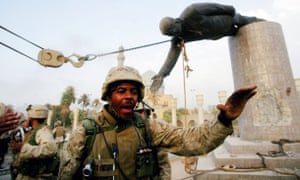Iraq war still casts a long shadow over a dangerous and deeply unstable region
As the British government faces intense public scrutiny from the Chilcot report, the war continues to cast a long shadow over Iraq, the Arab world and beyond.
Even at the time, in the face of bitter controversy and mass protests, it was seen as a pivotal event. That judgment has been repeatedly confirmed by its toxic and destabilising legacy – the spread of hateful sectarianism, the growth of al-Qaida and then Isis, the empowerment of Iran: all were the unintended but undeniable consequences of 2003; all, like the latest carnage in Baghdad,
Arab and western analysts and historians are in broad agreement on these points. Hindsight naturally helps, though some spoke out at the time of the risks involved in the war – and were ignored. “People did not think that al-Qaida andIran would play the role that they did,” Blair told the inquiry. Chilcot however, stated clearly on Wednesday: “The risks of internal strife in Iraq, active Iranian pursuit of its interests, regional instability, and al Qaida activity in Iraq, were each explicitly identified before the invasion.”
On another related issue, sometimes used to try to justify the invasion, few see any direct link between the fall of Saddam and the later uprisings of the Arab spring, which toppled four other dictators but left many in place, unscathed and more ruthless than before.
And, bringing a bleak story up to date, most experts argue too that the current crisis in Syria – the bloodiest of our times with 400,000 dead and millions made homeless – has been heavily, and negatively, influenced by the events of 2003 .
A Saudi who now works as a consultant in Dubai, has an unusual perspective – and rare inside knowledge. In 2003, he was an undercover agent for the British intelligence service MI6, having defected from al-Qaida as his doubts grew about its violent methods. “If Saddam is removed, a pillar of Arab nationalism will fall and it will only be replaced by Islamism on the Sunni or the Shia side,” he cautioned his handlers.
“Virtually all of Iraq’s neighbours provided shelter, support and in some cases finances and training to different insurgent groups. Iraqi Baathists were able to organise attacks from the safety of Amman and Damascus, while some Gulf states either tolerated or oversaw funding for Salafist-jihadist groups.”
Iran condemned the invasion but took advantage of its aftermath and gloated when Saddam was killed. “Iran was sucked into this conflict without wanting to get involved,” insists Foad Izadi, of Tehran University. “The Americans carved out a role by playing on Sunni-Shia tensions. We did not benefit.” Tehran’s enemies watched apprehensively.
“Iran won twice, first in Afghanistan and then in Iraq,” recalls Sima Shein, at the time a senior official with Israel’s Mossad spy agency. “The moment Saddam was gone, the Shia came out on top and the Iranians won a strategic victory.”
The American architects of the war defended their vision, even after the catastrophic disbanding of the Iraqi army in May 2003 – widely seen as the greatest blunder of the post-war period.
Iraq’s turmoil continued to affect the wider region, and to be affected by it, even as attitudes to the occupation shifted. “In the early years you had strong anti-US resistance among the Sunnis but after 2006-7, with the civil war and defeat of al-Qaida, Sunnis came to see the Americans as the lesser evil to Iranian domination,” notes Achcar.
The ultimate irony came in 2010 when Tariq Aziz, Saddam’s veteran foreign minister, accused Obama in a Guardian interview from his prison cell of “leaving Iraq to the wolves” by pressing ahead with a withdrawal of US combat troops in the face of continuing instability.
Debate about the Chilcot report will take place largely in Britain but it will likely be listened to far more widely. In the Middle East of 2016 perhaps only Kurds still view the war in a positive light – though in the words of Barham Salih, a leading Iraqi-Kurdish politician and deputy prime minister under Nouri al-Maliki, “Isis has demonstrated that the mission was not accomplished in Iraq”.
“The Iraq war is going to affect this part of the world for many generations to come,”
fine the original herhttps://www.theguardian.com/uk-news/2016/jul/07/iraq-war-still-casts-a-long-shadow-over-a-dangerous-and-deeply-unstable-region?
